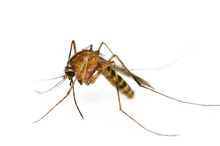With the coming of warmer weather and conditions conducive to growth in the mosquito population, health officials are warning about a potential outbreak of West Nile Virus and warning horse owners to consult their veterinarians about vaccinating their horses against the disease.

Mosquitos, carrier of deadly West Nile Virus
Weather conditions are ripe for an outbreak of West Nile Virus, and equine owners should consult their veterinarians about vaccinating their horses.
As of 01/10/12, 83 cases of West Nile Virus have been reported in the US for 2011 and 2012. Although the number of cases is not huge, the threat to horse and human health by the deadly disease makes it extremely important to take necessary precautions to prevent the disease.
In Kentucky,known for its large population of equines, Agriculture Commissioner James Comer has issued a warning that weather conditions are ripe for an outbreak of West Nile Virus and cited State Veterinarian Dr. Robert Stout’s advice that Kentucky equine owners should consult their veterinarians about vaccinating their horses against the disease.
“While we do not wish to cause unnecessary alarm, we are concerned about the equine population’s vulnerability to this potentially deadly disease,” said Commissioner Comer. “I am confident that Kentucky’s equine owners will act in the best interests of their horses and seek guidance on vaccinations.
West Nile is spread by mosquitoes, and mosquitoes thrive in the warm, wet conditions that accompany an early arrival of the spring season.
According to Dr. Stout, no horse in Kentucky that has undergone a full West Nile vaccination regimen is known to have contracted the virus since 2003.
West Nile Virus, which was first discovered in the United States in 1999 in New York causes encephalitis, or inflammation of the brain, in horses, humans, birds, and other warm-blooded animals. It is transmitted by mosquitoes that acquire it from infected birds. Humans and equine cannot transmit the disease.
West Nile virus belongs to a group of disease-causing viruses called flaviviruses, which are spread by ticks and mosquitoes. Other flaviviruses include yellow fever, Japanese encephalitis and dengue. Mosquitoes catch West Nile virus from biting infected birds.
More than 130 different bird species are known to have been infected with West Nile, and more than 40 species of mosquito can carry the West Nile virus. The virus circulates through the mosquito's bloodstream and into its salivary glands. Then, when the mosquito bites a an animal, it transmits the virus into its bloodstream.
Dig deeperTM
Learn more about West Nile Disease
